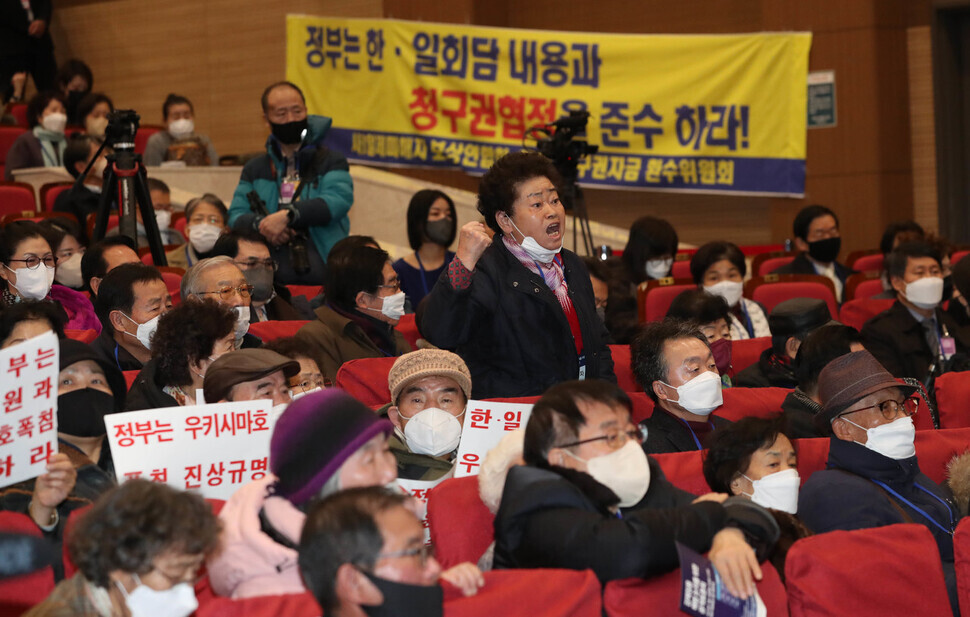hankyoreh
Links to other country sites 다른 나라 사이트 링크
Victims react with fury to S. Korea’s plan for Japanese forced labor compensation

A public debate held at the National Assembly on Thursday to discuss the solution to Japan’s forced labor mobilization deteriorated into a shouting match in which the words of panelists and shouts of protesters became hard to make out.
After Seo Min-jung, the director for Asian and Pacific affairs at the Ministry of Foreign Affairs, announced the plan for third-party compensation, Kim Young-hwan, head of the Center for Historical Truth and Justice, and lawyer Lim Jae-sung, who is representing the victims, point by point criticized all that was wrong with the proposal. Their words were met with various cheers of support and applause from the audience, while victims who agreed with the proposal booed.
Some victims not participating in lawsuits against the culpable Japanese companies believe that there will be no way to be compensated if the Supreme Court judges that the assets of companies guilty of war crimes should get cashed out.
These victims put up a banner at the public debate reading “Are the 15 people the only victims?” referring to the 15 victims named as plaintiffs in the court battle.
“We should not expect Japan to apologize or to participate in the compensation,” argued Park Hong-kyu, a professor at Korea University. He was met with shouts of “traitor,” as former forced laborers screamed in anger.
When lawyer Choi Woo-kyun explained the government’s legal principle that domestic companies who have the right of appeal replace compensation on behalf of the Japanese companies in question, the victims fought back by saying that “forced labor is different.” Choi ended up not being able to finish his speech during the debate.
When the microphone was handed to the audience, the hall became even rowdier.
A victim who sided with the government haphazardly introduced Park Chung-hee’s remarks made at the 1965 Agreement Between Japan and the Republic of Korea Concerning the Settlement of Problems in Regard to Property and Claims and Economic Cooperation, causing the opposition to protest strongly, which made the organizers wrap the two-hour long debate by saying that it was difficult to proceed as normal.
The interrupted speaker threw the microphone away and other participants jumped onto the podium to protest.
The victims also raised their voices outside the debate.
Prior to the debate on Thursday, the Campaign for Peace and Historical Justice for South Korea and Japan, various civic groups, Kim Sang-hee, Nam In-soon, Yang Ki-dae, and Lee Soo-jin of the Democratic Party; Kang Eun-mi of the Justice Party and independents Kim Hong-gul and Yoon Mi-hyang held an emergency press conference in front of the National Assembly building to criticize the Yoon administration’s compensation plan.
Lee Guk-eon, chairperson of the Citizens Association on Imperial Japan’s Labor Mobilization, who refused to participate in the public debate, calling it a “flop,” passed on a statement made by former forced laborer Yang Geum-deok:
“If all I wanted was money, I wouldn’t be doing this. Mitsubishi should apologize and compensate. If someone else does it for them, what does that make me? How much will they laugh?”
By Shin Hyeong-cheol, staff reporter
Please direct questions or comments to [english@hani.co.kr]

Editorial・opinion
![[Editorial] Penalties for airing allegations against Korea’s first lady endanger free press [Editorial] Penalties for airing allegations against Korea’s first lady endanger free press](https://flexible.img.hani.co.kr/flexible/normal/500/300/imgdb/original/2024/0502/1817146398095106.jpg) [Editorial] Penalties for airing allegations against Korea’s first lady endanger free press
[Editorial] Penalties for airing allegations against Korea’s first lady endanger free press![[Editorial] Yoon must halt procurement of SM-3 interceptor missiles [Editorial] Yoon must halt procurement of SM-3 interceptor missiles](https://flexible.img.hani.co.kr/flexible/normal/500/300/imgdb/child/2024/0501/17145495551605_1717145495195344.jpg) [Editorial] Yoon must halt procurement of SM-3 interceptor missiles
[Editorial] Yoon must halt procurement of SM-3 interceptor missiles- [Guest essay] Maybe Korea’s rapid population decline is an opportunity, not a crisis
- [Column] Can Yoon steer diplomacy with Russia, China back on track?
- [Column] Season 2 of special prosecutor probe may be coming to Korea soon
- [Column] Park Geun-hye déjà vu in Yoon Suk-yeol
- [Editorial] New weight of N. Korea’s nuclear threats makes dialogue all the more urgent
- [Guest essay] The real reason Korea’s new right wants to dub Rhee a founding father
- [Column] ‘Choson’: Is it time we start referring to N. Korea in its own terms?
- [Editorial] Japan’s rewriting of history with Korea has gone too far
Most viewed articles
- 1Months and months of overdue wages are pushing migrant workers in Korea into debt
- 2[Editorial] Penalties for airing allegations against Korea’s first lady endanger free press
- 3Bills for Itaewon crush inquiry, special counsel probe into Marine’s death pass National Assembly
- 4[Reporter’s notebook] In Min’s world, she’s the artist — and NewJeans is her art
- 560% of young Koreans see no need to have kids after marriage
- 6S. Korea discusses participation in defense development with AUKUS alliance
- 7Trump asks why US would defend Korea, hints at hiking Seoul’s defense cost burden
- 81 in 3 S. Korean security experts support nuclear armament, CSIS finds
- 9Korean firms cut costs, work overtime amid global economic uncertainties
- 10[Guest essay] Maybe Korea’s rapid population decline is an opportunity, not a crisis